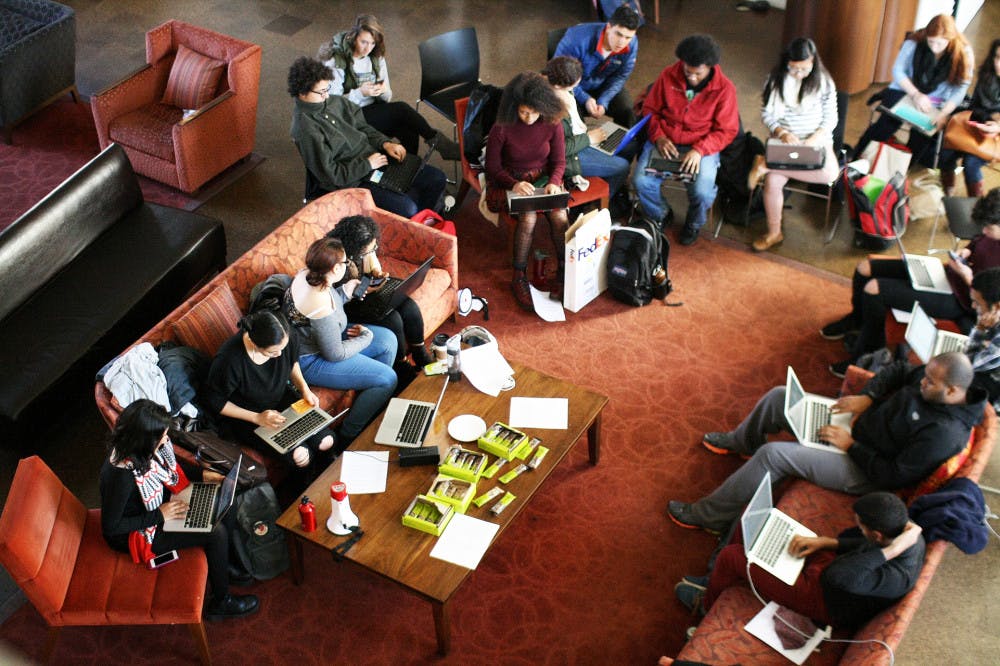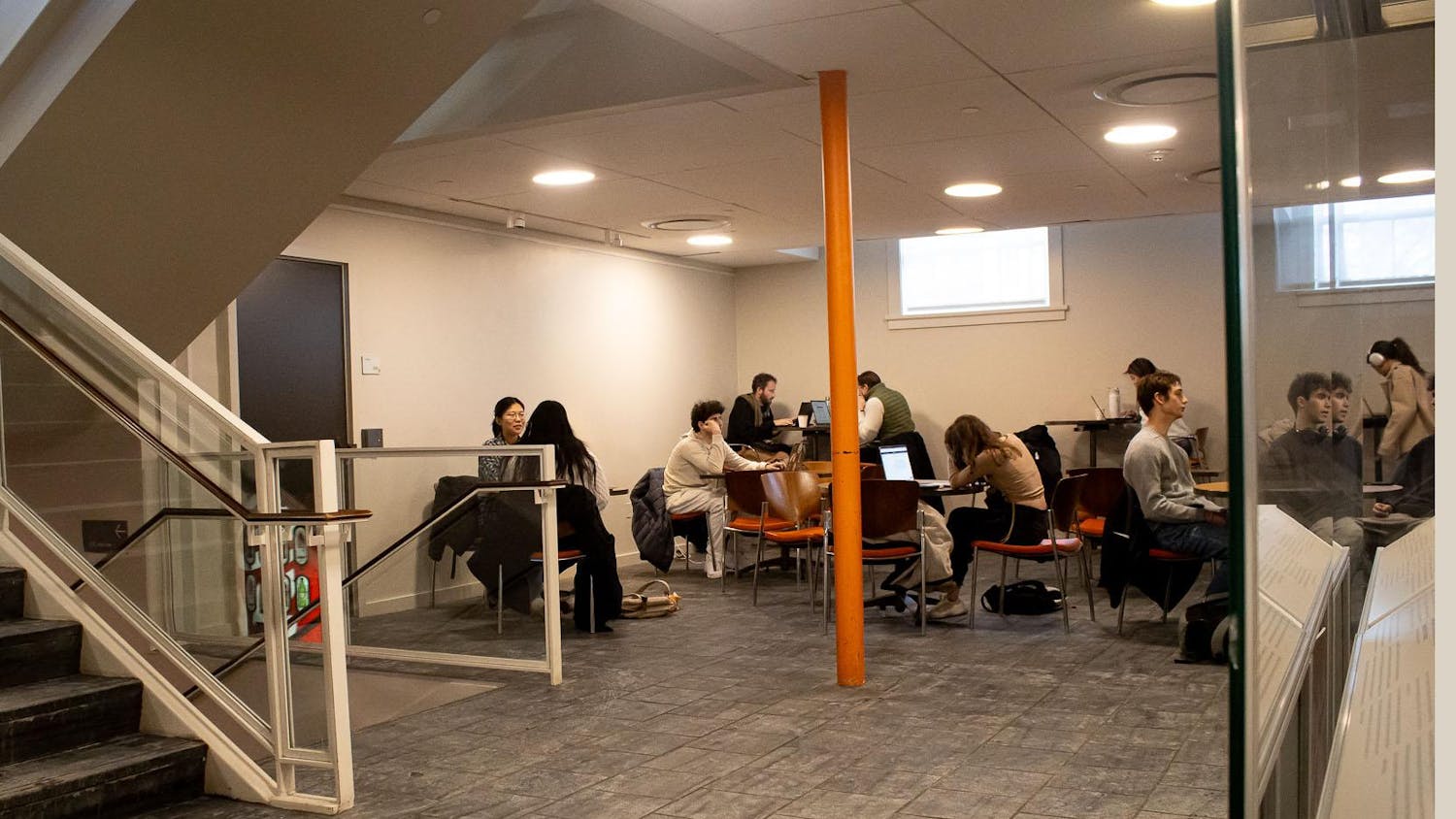Though the University is starting to see significant changes on campus following the release of the revised Diversity and Inclusion Action Plan in February, the 67-page plan contains the word “undocumented” three times.
Some students have been discontent with the exclusion of undocumented students, as expressed in the collective student demands on the Day of Reclamation demonstration in December 2015 . That day, demands from students were read aloud to an audience of students, faculty members and administration.
Some of the demands concerning undocumented students, which were drafted by a group of Latinx students, focused on legal services. They called for the hiring of a legal counselor to “guide and direct undocumented students to civil rights attorneys and local resources” and the establishment of a fund to supply undocumented students with free legal services.
Students also called for the hiring of staff of color in the financial aid and admission offices who would be responsible for the recruitment and retention of low-income, undocumented and first-generation college students and the creation of positions within the Office of Institutional Diversity and Inclusion, for those who have experience working with LGBTQ+, first-gen, minority, low-income or undocumented communities, the Latinx demands read.
University policies
Even though the DIAP didn’t meet the students’ demands, “the recruitment of first-generation students — whether undocumented or not — should be a fundamental responsibility of the entire staff and a major focus of our outreach efforts,” wrote Dean of Admission Jim Miller ’73 in an email to The Herald.
Specifically, the Office of Admission has prioritized the “recruitment of low-income and first-generation students of all kinds, including undocumented students” even before he started his position, Miller wrote.
“The University implicitly supports undocumented students by accepting them and providing private funding for students,” said Mateus Baptista ’14 MA’15.
Baptista, who was undocumented when he was a student, sought out the on-campus attorney, available twice a month for office hours and several other dates for phone calls. But he was redirected to off-campus resources for issues pertaining to immigration and legal status.
While undocumented students are ineligible for federal aid, Brown fills the financial gaps for the undocumented students it accepts, a policy that was clarified in 2013, The Herald previously reported. Baptista said that undocumented students are not need-blind when applying to Brown. They are considered international students, but if accepted, are financially supported.
The Office of Admission is clearly aware of undocumented students’ status when they go through the admission process, “but when they enroll, they are reported and tracked in the non-U.S. citizen category,” Miller wrote.
Student discontents
During his time at Brown, Baptista met three or four undocumented students. “I walked away from Brown saying I had an amazing experience … but only because I was lucky to meet another undocumented student,” he said, referring to a close friend he made who was also an undocumented transfer student. “Students shouldn’t rely on luck,” he said.
The University has “not articulated a clear and strong message that they support undocumented students,” Baptista added. “They’re not explicitly saying they support and validate us.”
In supporting undocumented students, the University “should be audacious, be more bold,” Baptista said. “Brown can and should be that leader.”
Undocumented students would benefit from an affirmation that they are “not just lucky to be here but … deserve to be here,” he said.
Kenneth Cruz ’18, president of the Latin American Student Organization, also said that there is still progress to be made.
“If a person is undocumented, of course you’re always fearful of the political sphere, and there’s always that worry in one’s life that they might get either deported or their loved ones will,” Cruz said, adding that this distracts them from their studies.
Undocumented students “are in a very specific and tight circumstance, and there’s no infrastructure or advising to deal with this,” said Roxana Sanchez ’18, president of La Alianza Latinx, a student group focused on strengthening the Latinx community within and outside Brown. Sanchez added that undocumented students and those with undocumented parents experience instability that takes a toll on their mental and emotional health.
“I feel like undocumented students are just glanced over,” she said. “There’s so much fear surrounding the issue (of legal status). I praise students on campus who come out. It’s not an easy thing to do.” She added that many undocumented students, for legal or personal reasons, may not have the liberty of speaking out about their legal status.
Sanchez, whose parents are living in the United States as undocumented residents, believes that there should be structural support for undocumented students and for students who have undocumented parents.
Though the University is diversifying its student body and recruiting low-income and first-gen students, the concept of undocumented students is still a “taboo topic” at many colleges, including Brown, Cruz said. “Something important for undocumented students is (that) they definitely need legal counseling,” she said, adding that the University “should have that resource and have someone willing to defend their rights and how to professionally defend their rights.”
Baptista would like to see resources for undocumented students be more visible, suggesting that the University hire a staff member who is aware of undocumented students and the legal hurdles they face and expand upon alumni relations, especially for first-gen and undocumented students.
Student activism
“We as students are very limited in what we can do,” though many of the goals that student groups have are achieved through student activism, Sanchez said, adding that student activists show the University what students need.
Student activism and the DIAP have sparked a new conversation among students and brought attention to how the University supports undocumented students, she said.
The rise of student interest in learning and discussing immigration in the United States show that students care about these issues, Sanchez said.
For example, the Brown Immigration Rights Coalition was revived this semester after a period of inactivity. BIRC consists of “community-based activists,” said Alexis Rodriguez-Camacho ’18, member of BIRC.
BIRC has been active on and off campus. For example, earlier this semester, BIRC rallied for undocumented Rhode Island residents to receive driving privilege licenses. As co-president of First-Gens@Brown, Rodriguez-Camacho said he seeks to address the needs of undocumented students as First-Gens@Brown progresses to recognize the common intersectionality between the two identities.
Minority Peer Counselors also hosted a workshop titled “Homeland (In)security” April 18. The workshop aimed to discuss how immigrants are received both within and out of borderlands, acknowledge both Southeast Asian and African immigrants beyond the stereotypical Latinx immigrant and analyze historical and current political policies concerning immigration.
The workshop’s facilitators also referenced Angie Ocampo’s ’15 website “Undocumented at Brown,” which was created as a part of her senior capstone project in the Sociology department. The website offers support and resources for navigating campus as an undocumented student and clarifies acceptance and financial aid policies for prospective students.
“The resources at Brown are lacking,” Ocampo said. During the research for her thesis, Ocampo reached out to students from other universities and found that at institutions where undocumented students were more organized and formed a support group, undocumented students were felt morally and practically supported as their peers helped the navigate on-campus resources.
“People will only divulge that they’re undocumented if they can assess that the people they’re talking to will understand what that means,” she said.
Ocampo created the website to offer “something applicable” to the community of undocumented students and prospective students.
While conducting her research, Ocampo tried asking various offices for the data on how many undocumented students were on campus, but was not able to ascertain the number, she added.
Students have also been left disappointed with regard to the language and speech around undocumented students.
“It feels like the terms (undocumented and low-income) are used interchangeably” in the DIAP, Sanchez said.
The DIAP grouped undocumented students with other underrepresented groups on campus rather than provide sufficient attention to them and the challenges they face, Sanchez said, adding that the plan didn’t specify what category undocumented students fall under, even though transparency in data and numbers is essential for student activists’ and administrators’ efforts.
The University’s administration has addressed aspects of the struggles that undocumented students face by increasing mentorship for various minorities on campus and providing more help for high-need students, but the legal aid and counseling described in the student demands leaves the document lacking, Sanchez said.
Rodriguez-Camacho helped draft the Latinx demands last semester, shortly after the alleged assault of a Dartmouth student by a Department of Public Safety officer at the fall Latinx Ivy League Conference. He recalls the day following the student’s alleged assault when students addressed President Christina Paxson P’19 in Salomon Hall. After a stressful and emotional conversation, Mary Grace Almandrez, interim assistant vice president for campus life and student services, stepped up to address the audience to express her understanding and care for the students’ concerns with the University.
“She reassured us and showed that she cared for us. For a quick moment, we forgot what it meant to be cared for and for administration to support us,” Rodriguez-Camacho said, adding that for him, the moment was a “realization that finding someone at this institution who cared about me was not going to happen often.”





